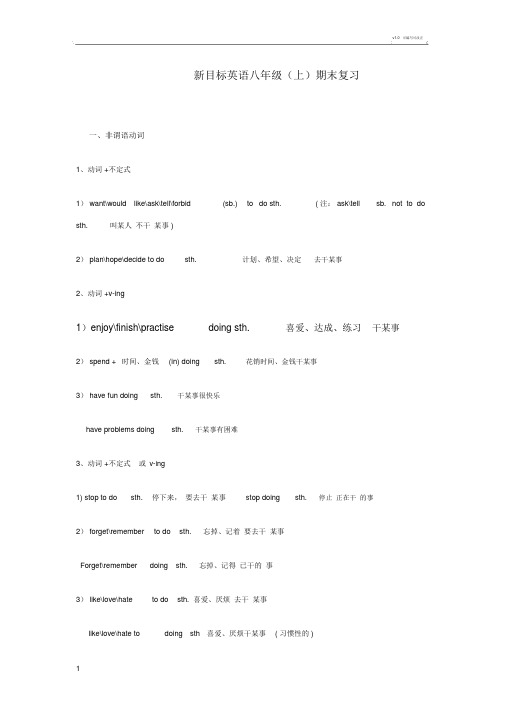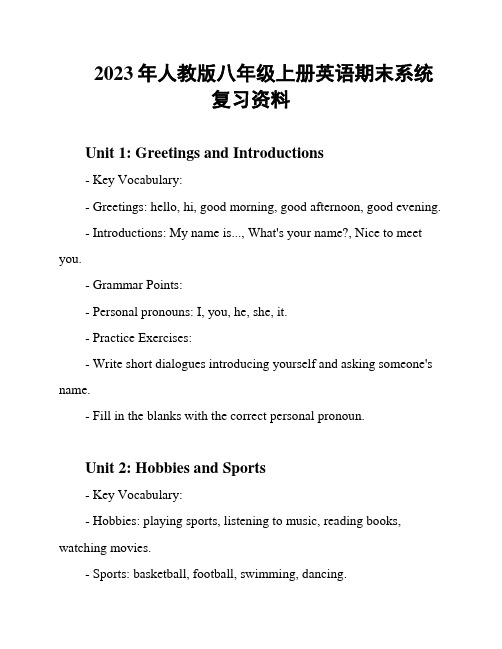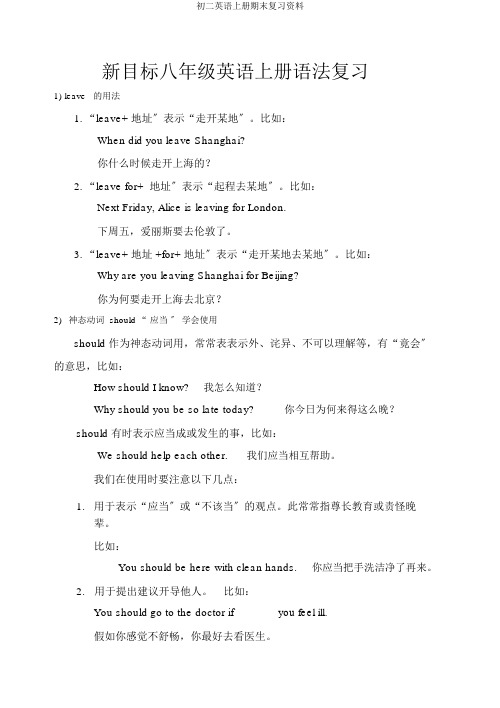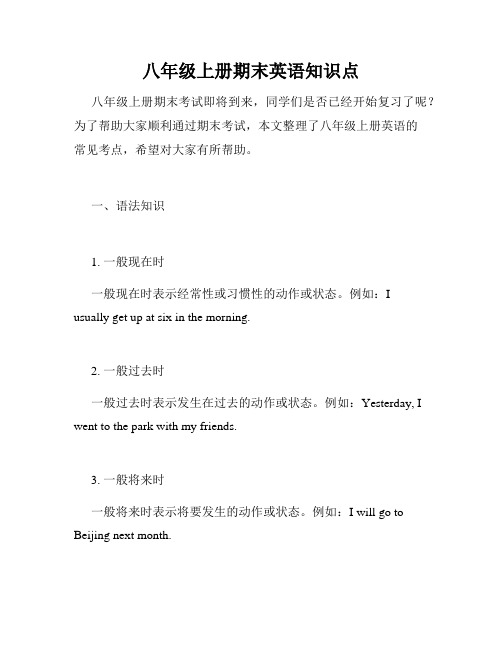初二英语上册期末复习资料必备学习
八年级英语上册期末复习知识点

新目标英语八年级(上)期末复习一、非谓语动词1、动词 +不定式1) want\would like\ask\tell\forbid(sb.) to do sth.( 注: ask\tell sb. not to do sth.叫某人不干某事 )2) plan\hope\decide to do sth.计划、希望、决定去干某事2、动词 +v-ing1)enjoy\finish\practise doing sth.喜爱、达成、练习干某事2) spend +时间、金钱(in) doing sth.花销时间、金钱干某事3) have fun doing sth.干某事很快乐have problems doing sth.干某事有困难3、动词 +不定式或v-ing1) stop to do sth.停下来,要去干某事stop doing sth.停止正在干的事2) forget\remember to do sth.忘掉、记着要去干某事Forget\remember doing sth.忘掉、记得已干的事3) like\love\hate to do sth. 喜爱、厌烦去干某事like\love\hate to doing sth喜爱、厌烦干某事( 习惯性的 )4)start\begin to do或doing sth.开始干某事(两种表达意义差别不大)4、 make\let\help sb. do sth.使、让、帮助某人干某事5、 see\watch \ hear sb. do sth.看见、听见某人干某事(一般包括某事全过程)See\ watch \hear sb. doing sth.看见、听见某人正在干某事6、 It takes\took sb.+时间、金钱to do sth.某人花销时间、金钱去干某事=sb. spend时间、金钱 (in) doing on sth.二、形容词与副词1、形容词 +ly ---副词如: quick----quickly heavy----heavily1)形容词修饰名词、代词等,修饰不定代词时,放在不定代词以后。
八年级上英语期末考试知识点

八年级上英语期末考试知识点本文主要介绍八年级上英语期末考试的知识点,包括词汇、语法、阅读和听力等方面,共分为四个部分。
一、词汇1. 名词常见的名词有人名、地名、国家名称、学科名称等等。
在考试中,可以通过选择题或填空题来测试对名词的掌握。
2. 动词掌握动词的时态和语态是英语学习的一个重要环节。
必须熟练掌握各种时态的用法,如一般现在时、一般过去时、现在进行时、过去进行时等等。
3. 形容词和副词形容词和副词是描述人、事物或感受的词语,要正确运用表示程度或比较级的形容词和副词。
二、语法1. 时态和语态掌握各种时态和语态的用法是英语学习的关键。
要注意在不同情况下选择不同的时态和语态。
2. 介词和冠词介词是修饰名词或代词的重要词汇。
在日常生活中,介词用法很多,要注意掌握各种情况下的使用规则。
冠词则是修饰名词的一种词语,包括定冠词和不定冠词。
3. 主谓一致在考试中,通常会考察主谓一致问题。
考生需要理解主语和谓语之间的关系,正确选择单数或复数形式。
三、阅读阅读理解是英语学习的核心部分之一,主要考察考生对短文和文章的理解能力。
考题形式包括选择、填空和简答等题型,要求考生仔细研读题目,理解文章的含义和主旨。
四、听力听力是英语能力的重要组成部分,也是考试中常见的一种题型。
考生需要通过听力材料听懂其含义,正确回答听力题目。
结语以上是八年级上英语期末考试的主要知识点,希望大家复习的时候能够认真对待,加强对英语基础知识的掌握和运用,达到更好的考试成绩。
2023年人教版八年级上册英语期末系统复习资料

2023年人教版八年级上册英语期末系统复习资料Unit 1: Greetings and Introductions- Key Vocabulary:- Greetings: hello, hi, good morning, good afternoon, good evening.- Introductions: My name is..., What's your name?, Nice to meet you.- Grammar Points:- Personal pronouns: I, you, he, she, it.- Practice Exercises:- Write short dialogues introducing yourself and asking someone's name.- Fill in the blanks with the correct personal pronoun.Unit 2: Hobbies and Sports- Key Vocabulary:- Hobbies: playing sports, listening to music, reading books, watching movies.- Sports: basketball, football, swimming, dancing.- Grammar Points:- Expressing likes and dislikes: I like/love/enjoy + verb-ing, I don't like/hate + verb-ing.- Question forms: Do you like...?, What sports do you play?, etc.- Practice Exercises:- Write a paragraph about your favorite hobby and why you enjoy it.- Have a conversation with a classmate about their hobbies.Unit 3: School Life- Key Vocabulary:- School subjects: English, math, science, history, geography.- School facilities: classroom, library, laboratory, playground.- Grammar Points:- Present simple tense: I study English at school, She goes to the library after school.- Adverbs of frequency: always, usually, often, sometimes, never.- Practice Exercises:- Write sentences to describe your daily school routine.- Fill in the blanks with the correct adverb of frequency.Unit 4: Family and Friends- Key Vocabulary:- Family members: father, mother, brother, sister, grandparents.- Describing people: tall, short, young, old, friendly, funny.- Grammar Points:- Possessive adjectives: my, your, his, her.- Practice Exercises:- Write a short paragraph about your family members and their characteristics.Unit 5: Daily Routines- Key Vocabulary:- Activities: get up, have breakfast, go to school, do homework, go to bed.- Time expressions: in the morning, in the afternoon, at night.- Grammar Points:- Present continuous tense: I am eating breakfast, She is going to school.- Adverbs of time: now, usually, currently, at the moment.- Practice Exercises:- Write sentences describing your daily routines using present continuous tense.- Fill in the blanks with the correct adverb of time.Unit 6: Food and Drinks- Key Vocabulary:- Food items: rice, noodles, vegetables, fruits, meat.- Drinks: water, juice, milk, tea, coffee.- Grammar Points:- Countable and uncountable nouns: How much/many..., a lot of, some, any.- Expressing preferences: I prefer..., I don't like..., I would like...- Practice Exercises:- Write a short paragraph about your favorite food and drink.- Have a conversation with a classmate about food preferences.Unit 7: In the City- Key Vocabulary:- Places: park, museum, cinema, restaurant, shopping mall.- Transportation: bus, subway, taxi, bicycle, on foot.- Grammar Points:- Prepositions of place: in, on, at.- Imperatives: Go straight, turn left, cross the street.- Practice Exercises:- Write directions from school to a particular place in your city.- Role play a conversation asking for and giving directions.Unit 8: Traveling- Key Vocabulary:- Means of transport: plane, train, car, ship, bike.- Travel destinations: beach, mountains, city, countryside.- Grammar Points:- Simple future tense: I will visit the beach next summer.- Question forms: Where will you go?, Will you travel by...?- Practice Exercises:- Write sentences about your dream travel destination using simple future tense.- Interview a classmate about their future travel plans.以上是2023年人教版八年级上册英语期末系统复习资料。
初二英语上册期末复习资料

初二英语上册期末复习资料新目标八年级英语上册语法复习1)leave 的用法1.“leave+ 地址〞表示“走开某地〞。
比如:When did you leave Shanghai?你什么时候走开上海的?2.“leave for+ 地址〞表示“起程去某地〞。
比如:Next Friday, Alice is leaving for London.下周五,爱丽斯要去伦敦了。
3.“leave+ 地址 +for+ 地址〞表示“走开某地去某地〞。
比如:Why are you leaving Shanghai for Beijing?你为何要走开上海去北京?2)神态动词 should “应当〞学会使用should 作为神态动词用,常常表表示外、诧异、不可以理解等,有“竟会〞的意思,比如:How should I know?我怎么知道?Why should you be so late today?你今日为何来得这么晚?should 有时表示应当成或发生的事,比如:We should help each other.我们应当相互帮助。
我们在使用时要注意以下几点:1.用于表示“应当〞或“不该当〞的观点。
此常常指尊长教育或责怪晚辈。
比如:You should be here with clean hands.你应当把手洗洁净了再来。
2.用于提出建议开导他人。
比如:You should go to the doctor if you feel ill.假如你感觉不舒畅,你最好去看医生。
初二英语上册期末复习资料3.用于表示可能性。
should 的这一用法是考试中常常出现的考点之一。
比如:We should arrive by supper time.我们在晚餐前就能到了。
She should be here any moment.她随时都可能来。
3) What...?与Which...?1. what与which都是疑问代词,都能够指人或事物,但是what 仅用来询问职业。
八年级上册期末英语知识点

八年级上册期末英语知识点八年级上册期末考试即将到来,同学们是否已经开始复习了呢?为了帮助大家顺利通过期末考试,本文整理了八年级上册英语的常见考点,希望对大家有所帮助。
一、语法知识1. 一般现在时一般现在时表示经常性或习惯性的动作或状态。
例如:I usually get up at six in the morning.2. 一般过去时一般过去时表示发生在过去的动作或状态。
例如:Yesterday, I went to the park with my friends.3. 一般将来时一般将来时表示将要发生的动作或状态。
例如:I will go to Beijing next month.4. 现在进行时现在进行时表示现在正在进行的动作。
例如:She is listening to music now.5. 过去进行时过去进行时表示过去某个时间正在进行的动作。
例如:I was watching TV at eight last night.6. 现在完成时现在完成时表示到目前为止已经完成的动作或状态。
例如:I have finished my homework.7. 过去完成时过去完成时表示过去某个时间之前已经完成的动作或状态。
例如:I had already eaten breakfast when she arrived.8. 一般条件句一般条件句表示假设条件下的结果。
例如:If it rains, we will stay at home.9. 祈使句祈使句表示请求、命令、建议等。
例如:Please turn off the light when you leave.10. 句型转换句型转换是英语中常见的考点,例如将陈述句转换成疑问句或否定句等。
二、词汇1. 同音异义词同音异义词指发音相同,但意义不同的单词。
例如:write 和right。
2. 近义词/反义词近义词是指意思相近或相似的词。
例如:big 和 large。
人教版八年级英语上册期末重点复习提纲

人教版八年级英语上册期末重点复习提纲
一、词汇复
1. 根据课文复重点单词和短语,包括拼写和中英文意思。
2. 运用词汇造句进行巩固练。
二、语法复
1. 复现在进行时、一般现在时、一般过去时的用法。
2. 复被动语态的构成和用法。
3. 复情态动词的用法和意义。
三、听力练
1. 听力练,包括听对话选择正确答案、听短文回答问题等。
2. 使用课本及其他资源进行听力训练。
四、阅读理解
1. 阅读课本中的文章,理解文章的大意和细节。
2. 进行相关的阅读理解题目练。
五、写作练
1. 复书面表达的基本写作技巧,如写作句型和段落结构等。
2. 进行写作练,包括写信、写日记等。
六、口语练
1. 进行口语练,包括对话,描述图片等。
2. 复相关语法和词汇,提高口语表达能力。
七、复技巧和备考方法
1. 总结复经验,制定科学有效的复计划。
2. 尽量多做题,检验自己的掌握程度。
3. 注重练听力和口语,增强应试能力。
以上为人教版八年级英语上册期末重点复习提纲,希望能帮助你对课程内容进行系统复习,取得好成绩。
八年级上册英语期末复习要点归纳
八年级上册英语期末复习要点归纳Unit 1: School Life•Vocabulary–School subjects–Classroom objects–Extracurricular activities•Grammar–Simple Present tense–Adverbs of frequency–Imperatives–Plural nouns–Prepositions of place•Reading–Reading comprehension on school lifeUnit 2: My New Teachers•Vocabulary–Describing teachers–Personal qualities•Grammar–Comparatives and superlatives–Simple Past tense–Irregular verbs•Writing–Letter or email to a teacherUnit 3: My Friends•Vocabulary–Describing personality–Hobbies and interests•Grammar–Present Continuous tense–Question words–Possessive adjectives•Listening–Listening comprehension on friends and hobbies Unit 4: Daily Routine•Vocabulary–Daily activities–Time expressions•Grammar–Present Continuous tense for future plans–Adverbs of time and frequency–Reflexive pronouns•Speaking–Describing daily routineUnit 5: Weekends and Holidays •Vocabulary–Leisure activities–Places to go on weekends or holidays–Festivals and traditions•Grammar–Simple Present tense vs. Present Continuous tense –Modal verbs for ability and permission–Adjectives for feelings and emotions•Reading–Reading comprehension on weekends and holidays Unit 6: Food and Health•Vocabulary–Food and drinks–Adjectives to describe food–Health and fitness•Grammar–Countable and uncountable nouns–Some, any, much, many, a lot of–Imperatives for instructions and advice •Writing–Recipe or food diaryUnit 7: Out and About•Vocabulary–Places in a city–Means of transportation–Directions and locations•Grammar–Future plans with be going to–Present Continuous for future arrangements–There is/There are•Speaking–Giving and understanding directionsUnit 8: Hobbies and Interests •Vocabulary–Types of hobbies–Activities for hobbies–Likes and dislikes•Grammar–Infinitives and gerunds–Present Perfect tense–Expressions of preference•Listening–Listening comprehension on hobbies and interests Unit 9: Technology•Vocabulary–Types of technology–Internet and social media–Advantages and disadvantages•Grammar–Present Perfect Continuous tense–Phrasal verbs related to technology–Expressing opinions•Reading–Reading comprehension on technologyUnit 10: Protecting the Environment•Vocabulary–Environmental issues–Actions to protect the environment•Grammar–Modal verbs for advice and obligation–Conditional sentences (type 1)–Passive voice for reporting news•Writing–Essay on environmental protection以上是八年级上册英语期末复习要点的归纳。
新人教版八年级上册英语全册期末复习必背知识点归纳
新人教版八年级上册英语全册期末复习必背知识点归纳一、语法知识点1. 一般现在时:表示经常性的或真实的情况例句:I usually go to school by bus.She always eats lunch at 12 o'clock.2. 一般过去时:表示过去发生的动作或存在的状态例句:They played football yesterday.He lived in London when he was young.3. 一般将来时:表示将来要发生的动作或存在的状态例句:I will visit my grandparents next weekend.She is going to cook dinner tonight.4. 现在进行时:表示现在正在进行的动作例句:They are watching a movie now.She is studying for the exam at the moment.5. 过去进行时:表示过去某个时间正在进行的动作例句:I was reading a book at 8 o'clock last night.They were having dinner when I called them.6. 情态动词 can 和 could:表示能力或许可例句:I can swim very well.He could speak three languages when he was young. 7. 情态动词 must 和 have to:表示义务、必须或强制性例句:You must finish your homework before going out.I have to wake up early tomorrow.8. 情态动词 should:表示建议或应该例句:You should eat more vegetables for better health. She should go to bed early for enough sleep.9. 动词不定式:表示目的、原因、结果或时态等例句:I went to the supermarket to buy some fruits.She is happy to hear the good news.二、词汇知识点1. 人称代词:用于代替特定人或物例句:He is my brother.They are good friends.2. 数词:表示数量的词语例句:There are ten students in the classroom.I have two cats and three dogs.3. 形容词:修饰名词或代词,描述人或物的特征例句:She is a beautiful girl.This is a big house.4. 副词:修饰动词、形容词、副词等,表示时间、地点、程度等例句:She runs fast.He speaks English fluently.5. 介词:介绍名词与其他词语之间的关系例句:I have a pen in my bag.The book is on the table.6. 连词:连接句子、词组或单词例句:I like swimming and playing basketball.She can play the guitar or the piano.7. 冠词:用于限定名词例句:I have an apple.The book on the table is mine.三、题型解析1. 完形填空题:根据上下文意思,选出合适的单词填空Tom: What's your favorite ________?Emily: I like watching ________.Tom: Me too. Let's go to the ________ tonight.A. colorB. movieC. sportD. book答案:B2. 阅读理解题:阅读短文,回答相关问题例题:My name is Lucy. I am twelve years old. I ________ to school every day. My favorite ________ is English. I like playing basketball ________ school. My dream is to become a ________ in the future.What does Lucy like playing?A. basketballB. soccerC. tennisD. volleyball答案:A3. 选择填空题:选择合适的单词或短语填空例题:Lucy: What's your ________ food, Tom?Tom: I like ________ because it tastes delicious.A. favoriteB. leastC. difficultD. easy4. 任务型阅读题:根据文章内容,完成相应的任务例题:请你根据短文内容,回答以下问题:What is the main idea of the passage?答案:The passage is about Lucy's daily life and her dream.四、写作技巧1. 写作时要注意使用适当的句式和词汇,使文章更加丰富多样。
八年级上册英语期末复习资料整理(完美版)
最新初中八年级上册英语知识点(打印版)Unit 1 Where did you go on vacation?(谈论假期生活,一般过去时)Unit 2 How often do you exercise?(谈论生活习惯,一般现在时)Unit 3 I'm more outgoing than my sister(谈论事物对比,形容词比较级)Unit 4 What's the best movie theater?(谈论事物比较,形容词最高级)Unit5 Do you want to watch a game show?(谈论内心想法,一般现在时)Unit6 I’m going to study computer science.(谈谈生活的目标,一般将来时)Unit7 Will people have robots?(对将来生活的预言,一般将来时)Unit8 How do you make a banana milk shake?(描述进程,祈使句)Unit9 Can you come to my party?(学习邀请,作出、接受和拒绝邀请,学习表请求的句子)Unit10 If you go to the party, you’ll have a great time.(作出决定,学习if的条件状语从句)①复习一般过去时②复合不定代词的用法③反身代词的用法④系动词的用法⑤动词后的to do和doing 的区别⑥ed形容词和ing形容词的区别⑦“近义词”的区别⑧本单元中的主谓一致现象⑨动词过去式的构成及不规则动词表⑩用同义短语转换同义句时谓语动词形式一致性的培养。
⑾感叹句的结构和连词的选择。
1. go on vacation去度假2.stay at home 待在家里3.go to the mountains 去爬山4. go to the beach 去海滩5. visit museums 参观博物馆6. go to summer camp 去参加夏令营7.quite a few 相当多8.study for 为……而学习9.go out 出去10.most of the time 大部分时间11. taste good 尝起来很好吃12.have a good time 玩得高兴13. of course 当然14.feel like 给……的感觉;感受到15.go shopping 去购物16.in the past 在过去17. walk around 四处走走18. because of 因为19. one bowl of… 一碗……20. the next day 第二天21. drink tea 喝茶22. find out 找出;查明23. go on 继续24.take photos 照相25. something important 重要的事26. up and down 上上下下27. come up 出来28. buy sth. for sb. / buy sb. sth. 为某人买某物29. taste + adj. 尝起来……30. look+adj. 看起来……31.nothing…but+动词原形除了……之外什么都没有32.seem+(to be)+ adj. 看起来……33. arrive in+大地点/ arrive at+小地点到达某地34.decide to do sth. 决定去做某事35. try doing sth. 尝试做某事/36. try to do sth. 尽力去做某事37. forget doing sth. 忘记做过某事/38. forget to do sth. 忘记做某事39. enjoy doing sth. 喜欢做某事40. want to do sth. 想去做某事41. start doing sth. 开始做某事42. stop doing sth. 停止做某事43. dislike doing sth.不喜欢做某事44. keep doing sth. 继续做某事45. Why not do. sth.? 为什么不做……呢?46. so+adj.+that+从句如此……以至于……47. tell sb. (not) to do sth. 告诉某人(不要)做某事48 .have a good time=enjoy oneself=have fun(doing sth.)玩得痛快三、重点句子:1. Where did you go on vacation? 你去哪儿度假的?2. Long time no see. 好久不见。
英语八年级上册期末复习资料
英语八年级上册期末复习资料Unit 1-6重点短语:1. quite a few相当多 2. most of the time大部分时间 3. taste good尝起来很好吃 4.find out找出;查明5.take photos照相6. tell sb. (not) to do sth. 告知某人(不要)做某事7. something important重要的事8.seem+(to be)+ adj. 看起来… 9. arrive in+大地点arrive at+小地点 10.buy sth. for sb. = buy sb. sth.为某人买某物11. nothing…but+动词原形除了……之外什么都没有 12.Why not do. sth.?为何不做……呢?13.so+adj.+that+从句如此……以至于……14.help with housework帮助做家务 15.on weekends在周末16.how often多久一次 17.hardly ever几乎从不 18. once a week每周一次 19.go to the movies去看电影 e the Internet用互联网 21. play tennis打网球22. stay up late熬夜;睡得很晚 23. have dance and piano lessons上舞蹈课和钢琴课 24. at least至少 25. an 8-year-old girl 一个8岁大的女孩 26.go to bed early早点睡觉 27. play sports进行体育活动 28. not at all 一点也不/不客气29. in one’s free tim e在某人的业余时间30.the most popular欢迎的 31. such as比如;诸如32.old habits die hard积习难改 33. go to the dentist去看牙医34. morn / less than多于;超过/ 少于 35.spend time with sb.和某人一起度过时光36. spend time on sth/ (in) doing sth. 37. ask sb. about sth.向某人询问某事38. It’s+ adj.(for sb.)+ to do sth. 对某人说做某事是……的。
- 1、下载文档前请自行甄别文档内容的完整性,平台不提供额外的编辑、内容补充、找答案等附加服务。
- 2、"仅部分预览"的文档,不可在线预览部分如存在完整性等问题,可反馈申请退款(可完整预览的文档不适用该条件!)。
- 3、如文档侵犯您的权益,请联系客服反馈,我们会尽快为您处理(人工客服工作时间:9:00-18:30)。
美式论文、报告写作技巧编者按:美式教育的特点即是课程内容强调学生参与及创新运用,因此,报告便成了常见的考核学生学习成果的方式,比如实验报告、学期报告、专题报告、研究报告及论文(含毕业论文)等。
研究生presentation 及seminar 的机会更是占很大的比重,有些甚至占学期成绩很大比例。
如何完成报告、论文同时得到良好的成绩,是本文提供给有志留学的有心人参考的目的。
美国大学生由於自小已养成自动寻找答案习惯,在启发式的教育环境下,写报告、论文对他们来说比较不陌生,虽然专业知识上美国学生不见得比外籍学生强,但是表达能力由於自小培养,加上英语能力的优势,常比外籍学生在报告、论文方面有较隹的利基。
反之中国学生比较缺乏报告写作的训练,因此如果在留学过程中无法适应美式教育会比较辛苦,其实论文、报告的写作要领其实不难,只要把握技巧就可水到渠成。
通常论文由篇首(Preliminaries),本文(Texts)以及参考资料(References)三部分构成;而这三大部分各自内容如下:(一) 篇首:封面(Title)序言(Preface)谢词(Acknowledge)提要(Summary)目录(Tables and Appendixes)(二) 本文:引言(Introduction)主体,含篇(Part)、章(Chapter)、节(Section) 、以及注释(Footnotes)(三)参考资料:参考书目(References or Bibliography)附录资料(Appendix)。
进行论文或报告写作之前,先要确定想要表达的主题,主题确定后,将其具体表达,即为题目。
题目可以提供研究者:一.研究的方向二.研究的范围三.资料搜集的范围四.预期研究成果通常在确定题目之後就开始找资料从事研究,建议在找资料之前最好去问教授有哪些参考资料来源可供参考引用。
构思为确定写作大纲或Proposal 的先前步骤,大纲是论文、报告的骨干,Proposal 是研究的架构、流程及范围的说明书。
如何构思大纲或Proposal为论文、报告写作前的必要准备工作。
好的论文或研究报告,要基于在完整、详实的资料上,而参考资料除了和教授商借之外,最主要的来源就是图书馆了,一般参考资料来源可分成教科书或手册、政府机构的报告、科技或商业方面的杂志,及会议性质的资料。
此外现代的电脑资料库也可帮助收集资料,在国外可利用学校的电脑连线资料库寻找自己需要的资料。
当一切准备就绪,即可开始着手写报告,一般报告还分大报告如期末、专题等报告,及小报告如Seminar 式的报告。
就算是小报告,也至少应含(一)TITLE PAGES :包含主题名称、作者、日期(二)Summary:即主要的结论(三)Introduction:包括理论背景及内容(四)Technical Sections:是论文的主体,为最重要的部份应再细分为几个片断。
(五)Conclusions:即扼要的结论(六)Appendixes:复杂公式的导引及叁考资料和电脑程式的报表可附加在此项美式报告的撰写通常要打字,两行式,行间若有未拼完的字要以音节来连接。
写报告通常需要用到电脑,如有计算数字统计图表的需求,也常会用到程式软体如PASCAL、LOTUS,统计分析软体如SAS,也是不可或缺的,电脑绘图在今日已成为工商界及学术界的重要工具,文书处理更是最基本的要求,因此Word for Window、Powerpoint、Excel便成了颇受欢迎的工具。
此外在英文语法、文法上的润饰与修改,如能请老美帮忙会比较好。
论文、报告完成后有时会需要做解说(Presentation),用英文来讲演对中国人来说算是一大挑战,通常课堂讲演时间为十五分钟到三十分钟,若是论文囗试则至少一小时。
投影机及麦克风的使用对讲演的效果有很大帮助,正式讲演前多预习几次,时间宜控制适中,上台时忌讳低头拿着报告照念,需留意听众的反应,切中主题,避免太多数字的导引。
新目标八年级英语上册语法复习1) leave的用法1.“leave+地点”表示“离开某地”。
例如:When did you leave Shanghai?你什么时候离开上海的?2.“leave for+地点”表示“动身去某地”。
例如:Next Friday, Alice is leaving for London.下周五,爱丽斯要去伦敦了。
3.“leave+地点+for+地点”表示“离开某地去某地”。
例如:Why are you leaving Shanghai for Beijing?你为什么要离开上海去北京?2) 情态动词should“应该”学会使用should作为情态动词用,常常表示意外、惊奇、不能理解等,有“竟会”的意思,例如:How should I know? 我怎么知道?Why should you be so late today? 你今天为什么来得这么晚?should有时表示应当做或发生的事,例如:We should help each other.我们应当互相帮助。
我们在使用时要注意以下几点:1.用于表示“应该”或“不应该”的概念。
此时常指长辈教导或责备晚辈。
例如:You should be here with clean hands. 你应该把手洗干净了再来。
2. 用于提出意见劝导别人。
例如:You should go to the doctor if you feel ill.如果你感觉不舒服,你最好去看医生。
3.用于表示可能性。
should的这一用法是考试中常常出现的考点之一。
例如:We should arrive by supper time. 我们在晚饭前就能到了。
She should be here any moment. 她随时都可能来。
3) What...? 与 Which...?1. what 与 which 都是疑问代词,都可以指人或事物,但是what仅用来询问职业。
如:What is your father? 你父亲是干什么的?该句相当于:What does your father do?What is your father's job?Which 指代的是特定范围内的某一个人。
如:---Which is Peter? 哪个是皮特?---The boy behind Mary. 玛丽背后的那个男孩。
2.What...? 是泛指,所指的事物没有范围的限制;而 Which...? 是特指,所指的事物有范围的限制。
如:What color do you like best?(所有颜色)你最喜爱什么颜色?Which color do you like best, blue, green or yellow?你最喜爱哪一种颜色?(有特定的范围)3. what 与 which 后都可以接单、复数名词和不可数名词。
如:Which pictures are from China? 哪些图片来自中国?4) 频度副词的位置1.常见的频度副词有以下这些:always(总是,一直) usually(通常)often(常常,经常) sometimes(有时候)never(从不)2.频度副词的位置:a.放在连系动词、助动词或情态动词后面。
如:David is often arrives late for school.大卫上学经常迟到。
b.放在行为动词前。
如:We usually go to school at 7:10 every day.我们每天经常在7:10去上学。
c.有些频度副词可放在句首或句尾,用来表示强调。
如:Sometimes I walk home, sometime I ride a bike.有时我步行回家,有时我骑自行车。
3.never放在句首时,主语、谓语动词要倒装。
如:Never have I been there.我从没到过那儿。
5) every day 与 everyday1. every day 作状语,译为“每一天”。
如:We go to school at 7:10 every day.我们每天7:10去上学。
I decide to read English every day.我决定每天读英语。
2. everyday 作定语,译为“日常的”。
She watches everyday English on TV after dinner.她晚饭后在电视上看日常英语。
What's your everyday activity? 你的日常活动是什么?6) 什么是助动词1.协助主要动词构成谓语动词词组的词叫助动词(Auxiliary Verb)。
被协助的动词称作主要动词(Main Verb)。
助动词自身没有词义,不可单独使用,例如:He doesn't like English. 他不喜欢英语。
(doesn't是助动词,无词义;like是主要动词,有词义)2.助动词协助主要动词完成以下功用,可以用来:a. 表示时态,例如:He is singing. 他在唱歌。
He has got married. 他已结婚。
b. 表示语态,例如:He was sent to England. 他被派往英国。
c. 构成疑问句,例如:Do you like college life? 你喜欢大学生活吗?Did you study English before you came here?你来这儿之前学过英语吗?d. 与否定副词not合用,构成否定句,例如:I don't like him. 我不喜欢他。
e. 加强语气,例如:Do come to the party tomorrow evening.明天晚上一定来参加晚会。
He did know that. 他的确知道那件事。
3.最常用的助动词有:be, have, do, shall, will, should, would7) forget doing/to do与remember doing/to do1.forget to do忘记要去做某事(未做);forget doing忘记做过某事(已做)The light in the office is still on. He forgot to turn it off.办公室的灯还在亮着,它忘记关了。
(没有做关灯的动作)He forgot turning the light off.他忘记他已经关了灯了。
( 已做过关灯的动作)Don't forget to come tomorrow.别忘了明天来。
(to come动作未做)典型例题---- The light in the office is still on.---- Oh,I forgot___.A. turning it offB. turn it offC. to turn it offD. having turned it off答案:C。
